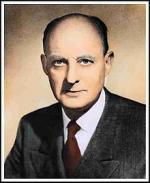Disable ads!
Reinhold Niebuhr
Karl Paul Reinhold Niebuhr (/ˈraɪnhoʊld ˈniːbʊər/; June 21, 1892 – June 1, 1971) was an American theologian, ethicist, public intellectual, commentator on politics and public affairs, and professor at Union Theological Seminary for more than 30 years. The brother of another prominent theological ethicist, H. Richard Niebuhr, he is also known for authoring the Serenity Prayer, and received the Presidential Medal of Freedom in 1964. Among his most influential books are Moral Man and Immoral Society and The Nature and Destiny of Man. Starting as a minister with working-class and labor class sympathies in the 1920s oriented to theological pacifism, he shifted to neo-orthodox realist theology in the 1930s and developed the theo-philosophical perspective known as Christian realism. He attacked utopianism as ineffectual for dealing with reality, writing in The Children of Light and the Children of Darkness (1944): "Man's capacity for justice makes democracy possible; but man's inclination to injustice makes democracy necessary." Niebuhr's realism deepened after 1945 and led him to support American efforts to confront Soviet communism around the world. A powerful speaker, he was one of the most influential thinkers of the 1940s and 1950s in public affairs. Niebuhr battled with religious liberals over what he called their naïve views of the contradictions of human nature and the optimism of the Social Gospel, and battled with the religious conservatives over what he viewed as their naïve view of scripture and their narrow definition of "true religion". During this time he was viewed by many as the intellectual rival of John Dewey. Niebuhr was also one of the founders of Americans for Democratic Action and spent time at the Institute for Advanced Study in Princeton, New Jersey. Niebuhr's long-term impact on political philosophy and political theology involve his utilizing the resources of the Christian faith to argue for political realism and his contributions to modern just war thinking. His work has also significantly influenced international relations theory, leading many scholars to move away from idealism and embrace realism. Many leading political scientists, such as George F. Kennan, Hans Morgenthau, Kenneth Waltz, and political historians, such as Richard Hofstadter, Arthur Schlesinger Jr., and Christopher Lasch, have noted his influence on their thinking. Andrew Bacevich labelled Niebuhr's book The Irony of American History "the most important book ever written on U.S. foreign policy." Aside from academics, numerous politicians and activists such as U.S. President Barack Obama, former President Jimmy Carter, Martin Luther King, Jr., Hillary Rodham Clinton, Hubert Humphrey, Dean Acheson, Madeleine Albright, and John McCain have also cited his influence on their thought. Arthur Schlesinger described Niebuhr as "the most influential American theologian of the 20th century" and Time Magazine posthumously called Niebuhr "the greatest Protestant theologian in America since Jonathan Edwards". Recent years have seen a renewed interest in Niebuhr's work, in part because of Obama's stated admiration for Niebuhr.
 Read more on wikipedia.org Read more on wikipedia.org
 All quotes by Reinhold Niebuhr All quotes by Reinhold Niebuhr
 Edit Edit
|

|
|
|
|
|
Background photo by Giuliana
|